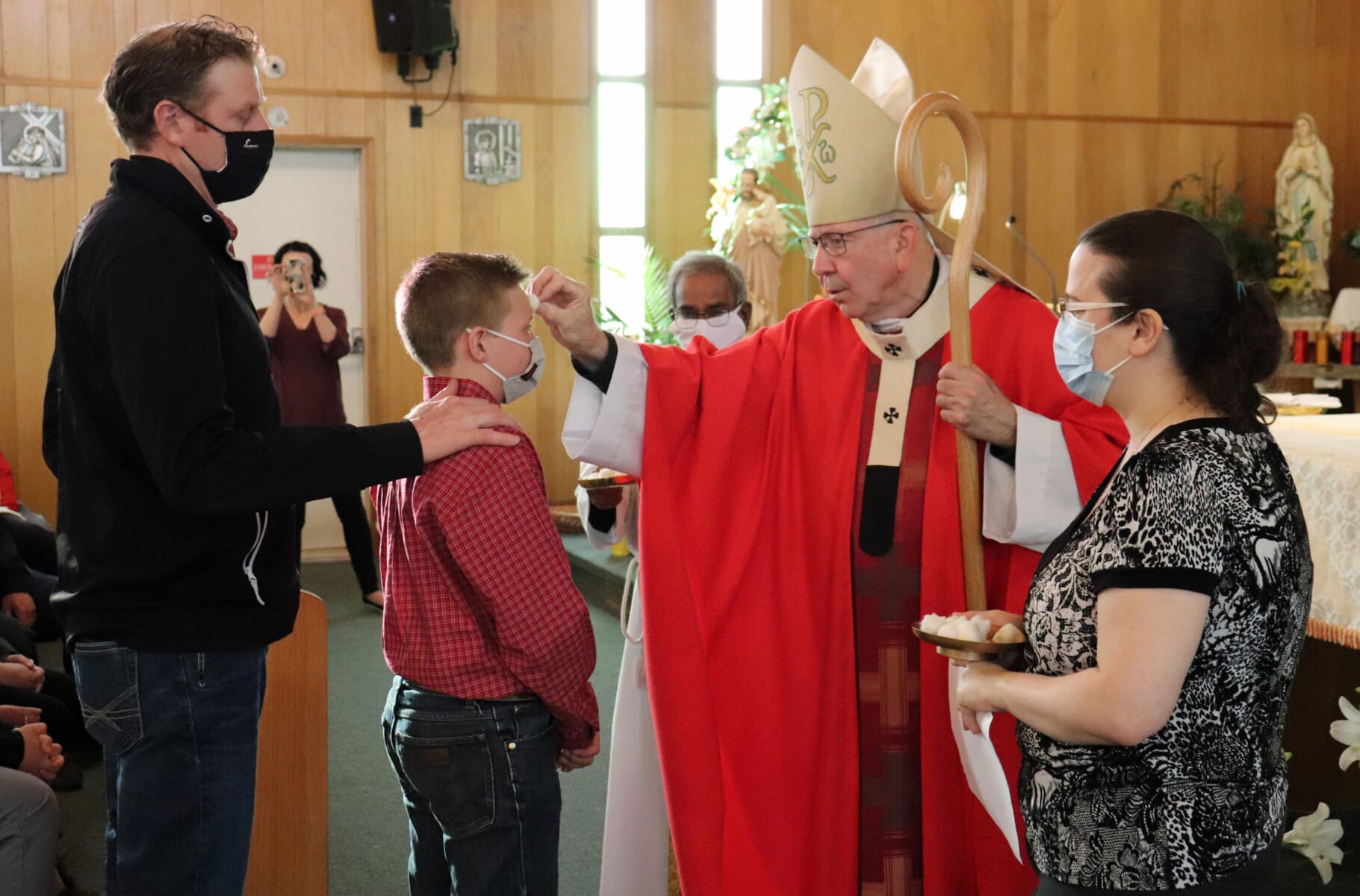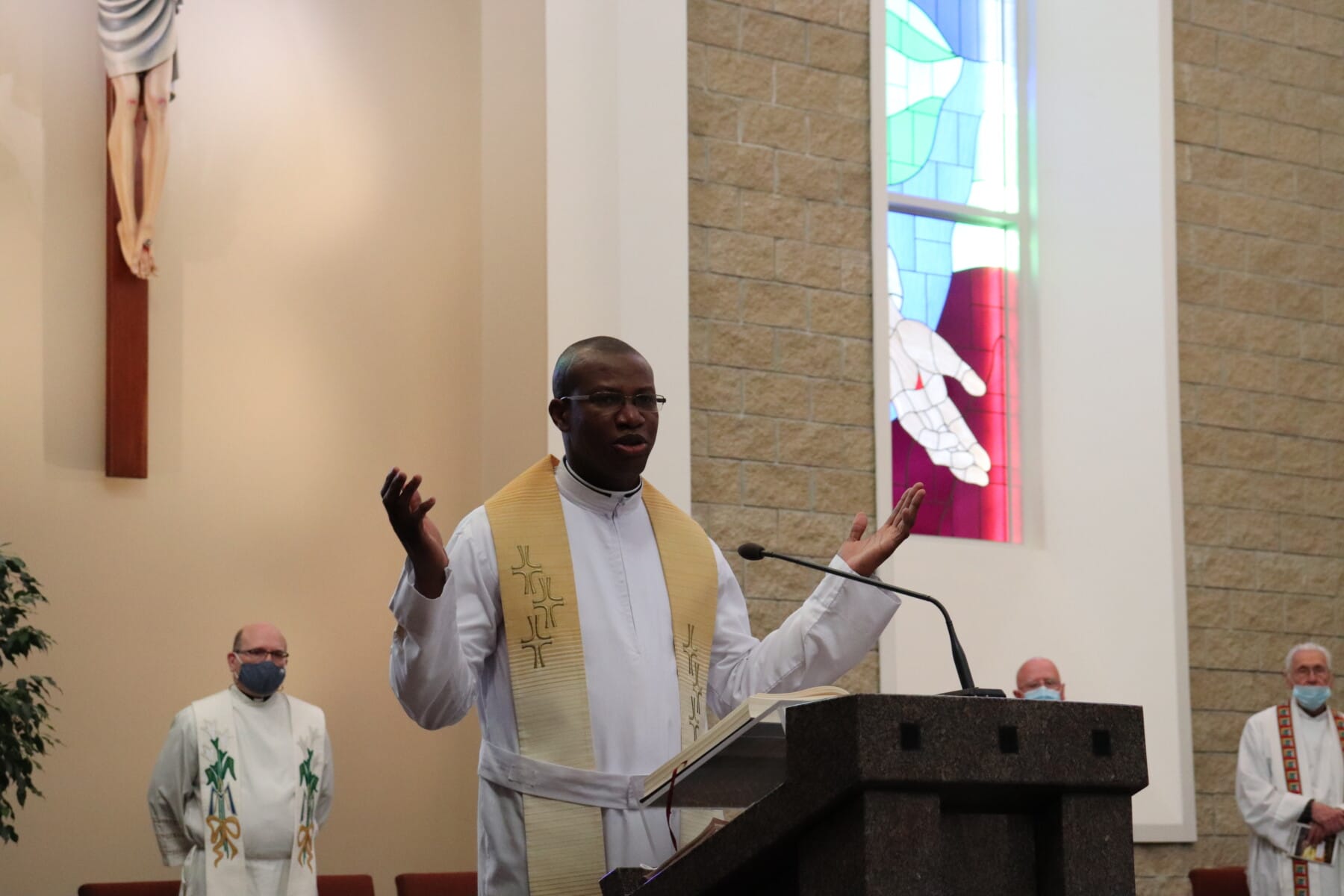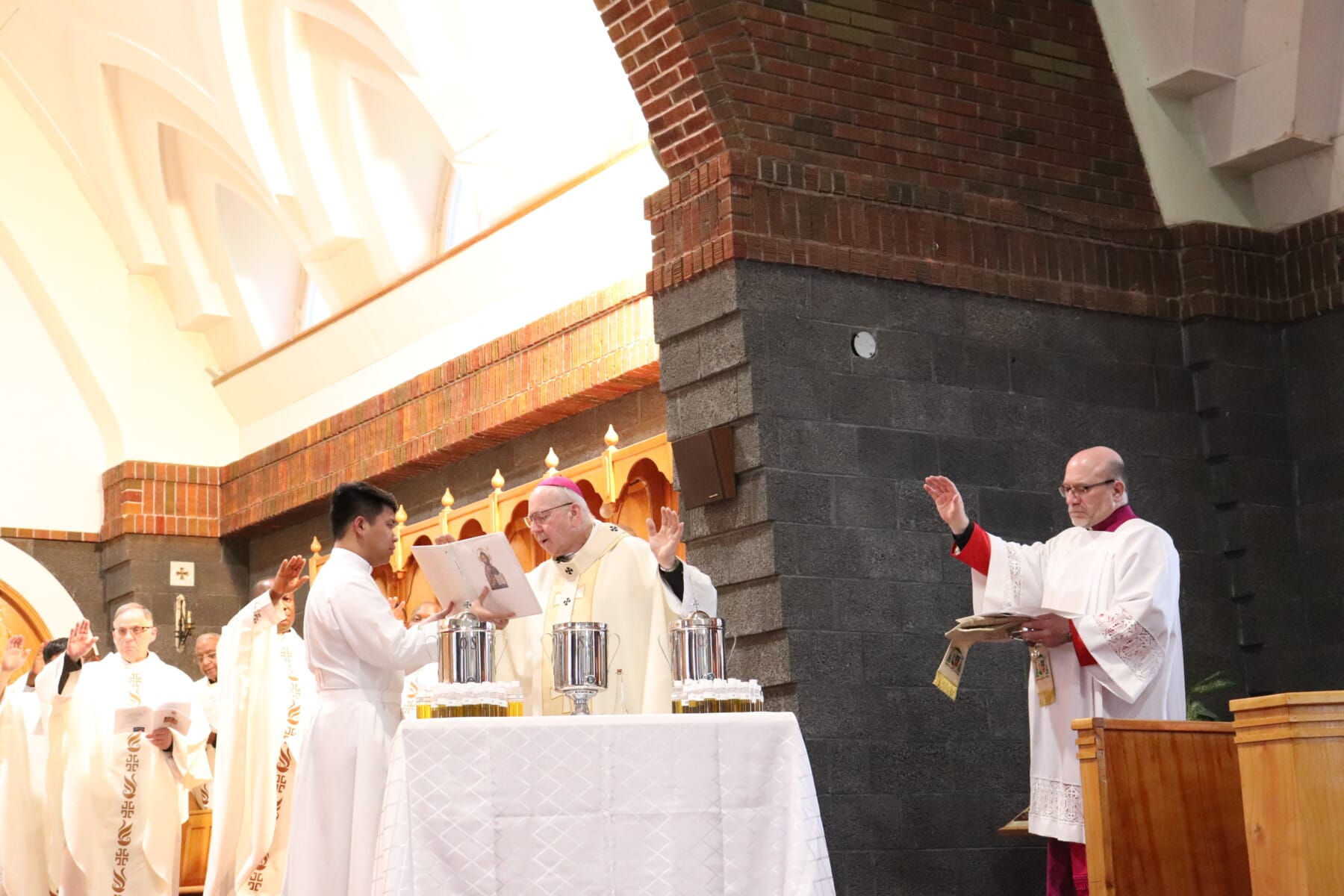
The oil that never runs dry
Sacramentum: The Holy Oils of Initiation
This article is the third installment of Sacramentum, a new series by the Office of Evangelization and Catechesis. This series explores the sacraments of the Catholic Church – the depths of their meaning, history, and, above all, the impact they have on each of us in our daily faith lives.
This article will focus on the significance of the Holy Oils of Initiation and is written by Fr. Emmanuel Ekanem.
A few weeks ago, I had the opportunity to anoint baby Gwen twice during her Baptismal ceremony. Unexpectedly, Gwen tried to grab the oil stock while I was about to anoint her. Since she could not get it, her immediate reaction was to wipe the Sacred Chrism from her forehead with her little fingers, and then bring it straight into her mouth with a gorgeous smile on her face.
Of course, Gwen’s little drama is not that unusual with infant Baptisms. What may be more striking to many people is the double anointing that takes place within this ceremony with two different oils. The significance of those Holy Oils and anointings are pivotal to what the oils sacramentally signify for the newly baptized. Both anointings were not simply a splash of oil on the skin. It was a gentle tracing of the cross with the blessed oil accompanied either by exorcizing and consecratory words – a powerful spiritual act with extraordinary effects upon the body and the soul.
Oil is central in almost everything we use and touch – from bathing soaps to body lotions to smartphones to the fuel in our car and more. Just realize, your morning coffee in a mug or a cup; the make-up, the toothpaste, the shaving cream, soap in our kitchen, our eyeglasses, even our clothing – all have had some element of oil in their making. Where would we be without oil in our lives?
The use of oil in Sacred Scripture is mentioned over 200 times. When the Jewish rebels fought for freedom to reclaim the temple in Jerusalem, they lacked oil but soon discovered that they had enough to last for eight days to light the menorah. Oil was also used to anoint kings as we read in Samuel 16: 11-13, with the anointing of David.
Ex nihilo (out of nothing), God continues to create, restore and renew the world and humanity with tangible and ordinary things. To heal the blind man, mud and saliva were used as agents of healing (John 9:6-7); to save the world, the Cross, that infamous gibbet, becomes the bed of redemption as blood and water flowed from his side (John 19:34), signifying the outpouring of divine mercy and grace to humanity; to qualify and empower those God has called, the chosen ones are anointed with oil.

There are three Holy Oils in the Church – Oil of Catechumen (OC), Oil of the Sick (OI) and Sacred Chrism (SC). As a teenager, I was anointed twice with two different oils at Baptism. Two years later, I was anointed with the oil of Chrism at Confirmation. Due to physical health issues, I have been anointed thrice with the oil of the sick. And a few years ago, the Sacred Chrism was poured into my palms – my hands were consecrated as a priest. The use of oils in those moments are fundamental to both Christian initiation and to the spiritual strengthening we need for our mission. Therefore, this is more than a mere ointment. St. Cyril cautions us to take seriously the gift of the holy oil:
“Beware of supposing that this ointment is mere ointment. Just as after the invocation of the Holy Spirit the Eucharistic bread is no longer ordinary bread, but the Body of Christ, so this holy oil, in conjunction with the invocation, is no longer simple or common oil, but becomes the gracious gift of Christ and the Holy Spirit, producing the advent of His deity.” (Confirmed in a Faithful Community Candidate’s Handbook – p. 114).
With those words of St. Cyril, let us consider the use of oil in our faith life. The Sacraments are sacred moments in which we encounter Christ in a most tangible and ceremonious way on our journey of faith. We have noted that oil is used in the Sacraments of Baptism, Confirmation, Holy Orders, and the Anointing of the Sick. Baptism is one of the Sacraments of Initiation, and it is also the first step on this journey. In the ritual of conferring Baptism, there is firstly, the Oil of Catechumens. The one to be baptized is anointed to renounce Satan and thus prepare the individual for the “strength to confess the faith of the Church, to which he/she will be ‘entrusted’ by Baptism”. (CCC, 1237) This anointing also strengthens our identity as a friend of Christ. In our lives, we have made many friends, some closer than others. We sometimes take on their actions, with God’s grace, for the good. What better friend could we have and imitate than Jesus? We learn about Him and His interactions with others, we hear His message in the Gospels. Faith is not static or lifeless or without courage. The anointing of this oil prepares us for the challenges which lie ahead of us.

With the Oil of Chrism, we are sealed and set apart for Christ. The Priest says during post-baptism anointing, “As Christ was anointed Priest, Prophet, and King, so may you live always as members of his body, sharing everlasting life.” What sets us apart makes us different. At the same time, what sets us apart gives us a common identity, purpose and mission. The chosen one requires the sealing or pouring of oil to initiate and prepare him for the task ahead. In the case of David and all the baptized, the sacramental anointing of Sacred Chrism is a consecratory act of setting apart, sanctifying the individual, and strengthening the chosen for what lies ahead. Hence, we now have an identity that characterizes what we are called to be and to do.
For all the baptized, the baptismal anointing with Sacred Chrism spiritually empowers us with three gifts – as priest, prophet and king. We take on the identity of Christ. This identity is not a fancy title. It characterizes who we are and what we are called to do in the world – to bear witness to what we represent. Just like the name “Christian,” to be baptized is to be a follower of the teachings of Christ. For the ordained priests, the pouring of the Chrism on their palms consecrates them for service – and they take on the identity, altar Christus. This identity is what they are called to be and called to do for God, his Church and the people.
Unlike vehicles which need routine oil changes to function adequately, the one-time reception of the Sacred Chrism leaves an imprint in the soul that cannot be erased or dried out. With this indelible mark as the sons and daughters of Christ the Anointed One, we are equally sealed with the Holy Spirit to “spread and defend the faith by word and action as true witnesses of Christ, to confess the name of Christ boldly, and never to be ashamed of the Cross” (CCC 1303).
Hence, while the regular oil we use each day has the potential to dry out, the spiritual effects of the Holy Oils transcend the ordinary kind – for we are constantly and inwardly graced thanks to them. Thus, with firm faith in God’s promise to be with us till the end of time, let us trust the words of the prophet Elisha: “The jug of oil will never run dry…” (I Kings 17:14). God’s blessings through the Holy oils are limitless and eternal.
As we re-examine (like an oil check-up) our Christian life each day, it is essential to look at our faith journey. In our daily prayers, we need to say “Spirit of the Living God, fall afresh on us, fill us, use us, and send us forth.” Like Samuel ready for his mission, let us constantly “fill our horn with oil and go out to bear witness to Christ” (1 Sam 16:1) and to constantly “keep our lamps filled with oil” (Mat. 25:4) so that we may face the challenges of life with the strength of our faith.